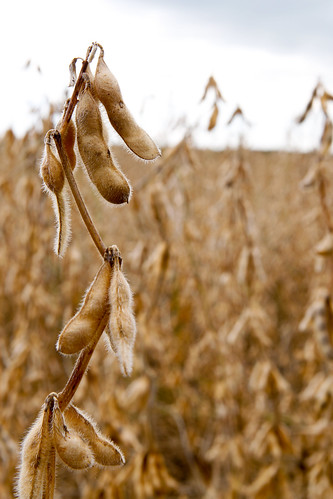Cooler weather timed right helped push soybeans to new yield record
Fast Facts:
-
- A record yield for Arkansas soybean yields in 2014
- Despite a wet spring, dry conditions in fall make for successful harvest
- 48 bushels per acre is new state average yield record
(394 words)
(Newsrooms: with file art
Pods - www.flickr.com/photos/uacescomm/6266412777
Wide shot of field in rain - www.flickr.com/photos/uacescomm/4949154906)
LITTLE ROCK -- A relatively cool summer and fortunate timing have led to record Arkansas
soybean yields in 2014.
Despite rain-delayed planting throughout the eastern half of the state, Arkansas soybean
growers were able to harvest the vast majority of the crop through September and October,
Jeremy Ross, extension soybean agronomist for the University of Arkansas System Division
of Agriculture, said.
“Because of the wet conditions in the spring, we were delayed getting a big portion of the crop planted in a timely manner” Ross said. “But we harvested pretty rapidly. Driving around, there’s still a field here and there that hasn’t been harvested, but we see that any given year.”
This year’s harvest yielded 48 bushels per acre across 3.3 million harvested acres, according to the U.S. Department of Agriculture’s National Agriculture Statistics Service. The average represents a new state record, and an increase of more than 10 percent in yield over 2013.
Ross said the relatively mild summer, including the coolest July on record in Arkansas, was the primary factor in the year’s record yield.
“During the end of July and the first part of August, the majority of the soybeans are going through reproduction,” he said. “Any time you have moderate conditions during reproduction, you’re always going to have better yields, just because you’re not putting as much stress on the plant.”
Ross said another factor in 2014’s soybean success was improved soybean crop management, focusing on timely application of irrigation and pesticides.
“A third part is that every year, we get a new variety of soybean that’s a little better than the previous variety,” Ross said. “I think genetics play a big role in that, that we’re just getting better and better bean varieties from both public institutions and private industry.”
Ross said that the chief challenges for Arkansas soybean growers haven’t changed much over the past few years, including herbicide-resistant weeds including pigweed, as well as insects and other pests that thrive in the relative humidity of the Delta.
Ross said Arkansas growers are likely to plant additional soybean acreage in 2015, if commodity prices for corn, cotton and rice continue to fall.
”Corn prices have fallen quite a bit,” he said. “It doesn’t take as much money to produce a soybean crop as a corn crop. You’ve got more inputs and things like that, so guys are just putting a pencil to it."
For more information about soybean production, contact your county extension office or visit www.uaex.uada.edu or http://arkansascrops.com.
The Arkansas Cooperative Extension Service is an equal opportunity institution. If you require a reasonable accommodation to participate or need materials in another format, please contact your County Extension office (or other appropriate office) as soon as possible. Dial 711 for Arkansas Relay.
Pursuant to 7 CFR § 15.3, the University of Arkansas System Division of Agriculture offers all its Extension and Research programs and services (including employment) without regard to race, color, sex, national origin, religion, age, disability, marital or veteran status, genetic information, sexual preference, pregnancy or any other legally protected status, and is an equal opportunity institution.
By Ryan McGeeney
The Cooperative Extension Service
U of A System Division of Agriculture
Media Contact: Ryan McGeeney
Content specialist
U of A Division of Agriculture
Cooperative Extension Service
(501) 671-2120
rmcgeeney@uada.edu
Related Links
